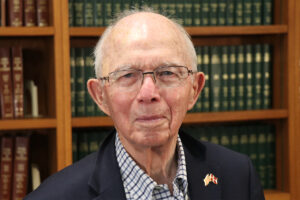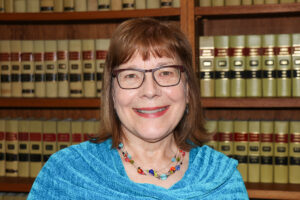Topic: Kansas Supreme Court

Interview of Richard (Dick) Bond, September 6, 2019
Interviewed by Joan Wagnon
Former Senate President Dick Bond candidly discusses his 14 year career in the Kansas Senate which followed a 25 year career in Washington DC as chief of staff for 3 congressmen. Well known in Kansas Republican circles, Bond was appointed to fill a vacancy when Senator Jack Walker became Lieutenant Governor. Bond compares the politics of Washington to Kansas. He saw the passage of liquor-by-the-drink as a boon to economic development. Bond is most proud of the renovation to the Kansas Capitol which was started under his term as President of the Kansas Senate. He Show Morereflected on the changes in the Republican party in recent years and the role the Right to Life movement played in those changes. Show Less

Interview of Fred Kerr, March 30, 2015
Interviewed by Burdett Loomis
This is the first of two oral history interviews of Fred Kerr in this collection. (Ed Flentje conducted the second interview 2018.) Kerr reflects on his 15 years in the Kansas Senate representing the 33rd Senate district. He recalls Senate leaders and fellow Senators who helped him as a freshman and the influence of those mentors on his career. Fred talks extensively about the process involved in securing a leadership position in the Senate and the dynamics of leadership races. He also reflects on the urban-rural divide in Kansas politics that during the late Show More1970s and early to mid 1980s was often more of a force than the partisan divide. A version of this interview is also posted on KansasMemory.org, the website of the Kansas Historical Society. A more recent oral history interview of Fred Kerr is here. Show Less

Interview of Lawton Nuss, July 27, 2022
Interviewed by Richard Ross
Retired Chief Justice Lawton Nuss describes his attempts to be appointed to the Court of Appeals (he was not) and to the Supreme Court. Nuss served as Acting Chief during the illness of Chief Justice Davis. After becoming Chief Justice in 2010 he became the chief spokesman and administrator for the entire judicial branch of nearly 1600 employees and 250 judges. In 2014-15 he appointed a Court Budget Advisory committee to help resolve an eight million dollar budget shortfall. He discussed at length the legislative reaction to the Gannon v State school finance case which was Show Morefiled in 2010 and not finally resolved until 2019. Nuss describes his work with the conservative leadership in the state legislature, and a conservative governor, and their attempts to gain more control over the courts. He dealt with budget shortfalls that resulted in closing the courts; attempts to elect rather than appoint judges; and threats to change the role of the courts in the constitution. Nuss was a vigorous defender of the judicial system's independence against legislative interference. He cited the Supreme Court’s Solomon case which essentially answered the question, "‘Should the judicial branch have to give away some of its power granted directly by the people in their Constitution in order to get funding from the legislature.” The court's decisions on school finance continued to provoke the legislature during his tenure. Show Less

Interview of Ed Larson, November 4, 2022
Interviewed by Richard Ross
This interview of longtime Kansas lawyer and jurist, the Honorable Ed Larson, gives a clear understanding of the workings of both Kansas Court of Appeals and the Kansas Supreme Court. Joining the appellate court in 1987 as a general practice lawyer exposed him to many more criminal cases than he had seen in his practice in Hays. He liked the court's practice of traveling around the state for hearings. Larson believed that solving the problems of individuals was the most important work they did, although there were many high-profile cases such as the sale of Blue Cross Show MoreBlue Shield to an out-state company. Larson is a supporter of merit selection for judges and credits the availability of the retirement system for judges with allowing judges to retire with dignity and benefits. Show Less

Interview of Lee Johnson, May 22, 2023
Interviewed by Jim Concannon and Richard Ross
Retired Supreme Court Justice Lee Johnson is interviewed by his law school professor, Jim Concannon and colleague, Richard Ross about his career as an appellate judge on both the Court of Appeals and the Kansas Supreme Court. Justice Johnson's path to the Supreme Court was a little different than most who served. He was a small town lawyer, a mayor and businessman from rural Kansas. He was appointed first by a Republican governor to the Court of Appeals; then by a Democrat governor to the Supreme Court. The interview clearly describes how the Court of Show MoreAppeals functions, and how the appointment of several judges from that court to the Supreme Court influenced how the Supreme Court operated. He describes the role of dissents and their importance to the decision-making process. Upon his retirement, Johnson returned to Caldwell where he was born. Show Less

Interview of Richard Ross, March 13, 2024
Interviewed by Eric Rosen
Richard Ross, from 1978 to 2016 served as the Reporter of Decisions of the Kansas Appellate Courts, a constitutional office. He edited over 132 volumes, 81 Kansas Reports and 51 Kansas Court of Appeals Reports in his 39-year career. Appearing in the Kansas Supreme Court conference room, Supreme Court Justice Eric Rosen interviewed Ross, who described in detail the processes he used to publish the Reports. When he started, there were no computers, just typewriters to create the courts' opinions. During Ross' early years as Reporter, the court moved from the Capitol, across the street into Show Morethe Judicial Building. As technology advance, the process of creating the Reports changed, but also the volume of work increased. The interview gives an insight into the inner workings of the Court and its judges/justices. It also chronicles the community work that Ross does, fund-raising for the renovation of Constitution Hall in Topeka with Friends of the Free State Capitol and serving on the Washburn University Foundation Board of Trustees. Show Less

Interview of Evelyn Wilson, April 21, 2025
Interviewed by Richard Ross
Evelyn Wilson’s interview provides an excellent explanation of the unique role of the Kansas Supreme Court. Wilson provided a thorough explanation of how Supreme Court Justices are selected in Kansas and explained the importance of the judicial branch remaining separate from the other two branches of government and emphasizing that each branch was designed to be completely separate. The role of the Judiciary is to interpret the law. She believes there is always a method to make the law better, to change the law, if you work within the process that was designed by the writers of Show Morethe U.S. Constitution. Her closing admonition, “… we all have a job to do, and that job is so important.” It’s to vote. “The Supreme Law is the people’s law, not a king. As long as we protect the republic, that will remain the case. And if we don’t protect the republic, it might not be.” She also shares her personal health struggles and deep commitment to the responsibilities of her position that led her to the decision to retire.
Highlight -- short excerpt from the interview
